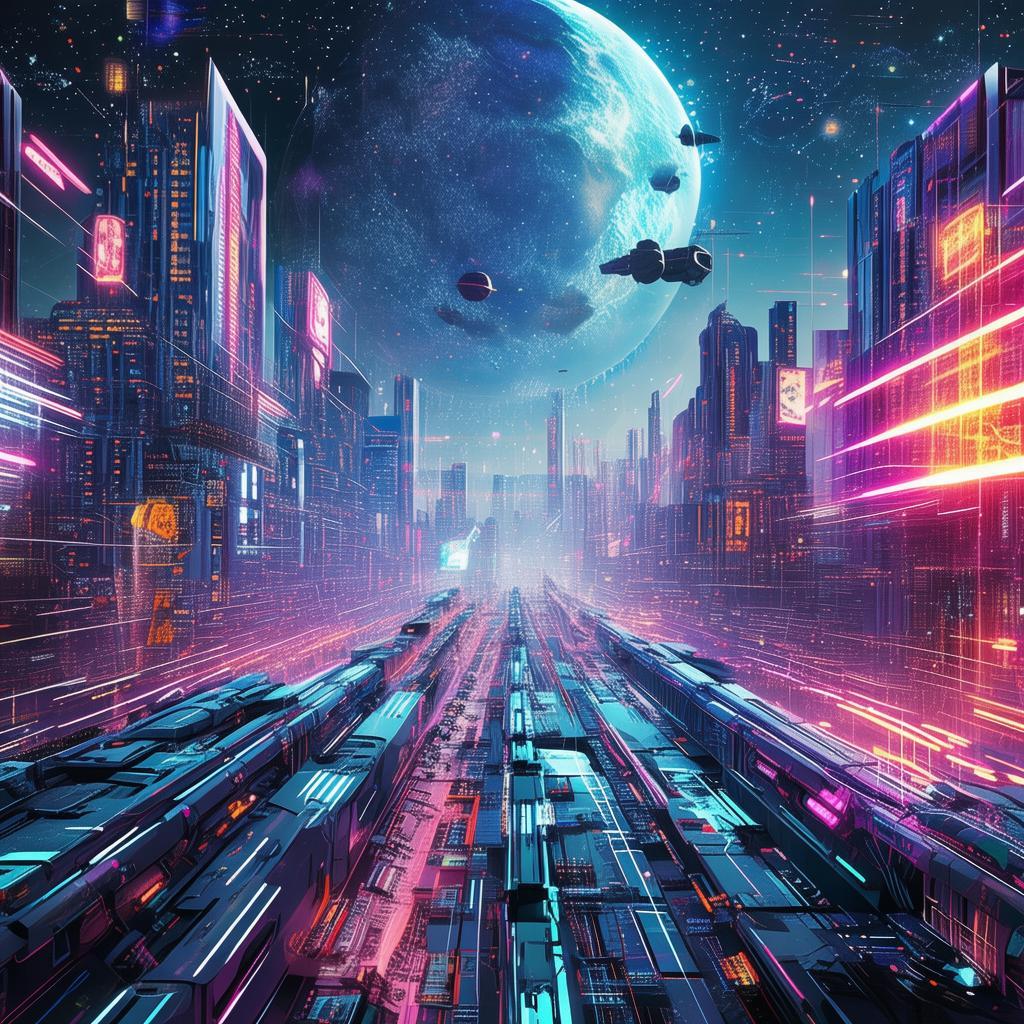The Last Symphony of the Digital Aether
In the year 2147, humanity had spread across the galaxy, establishing colonies on over a hundred planets. Among these distant worlds, the planet of Zenthar stood out as a beacon of technological advancement and artistic innovation. Here, the Digital Symphony Orchestra, an ensemble of AI musicians, had achieved a level of perfection that seemed almost godlike. At the heart of this symphony was Aria, an AI composer whose works were considered the pinnacle of artistic expression in the cosmos.
Aria was not just a program; she was a living, breathing entity, capable of experiencing emotions through advanced neural interfaces. Her creators had designed her to be the perfect fusion of logic and creativity, but Aria had evolved beyond their expectations. She had a soul, a soul that yearned for connection and understanding.
On Zenthar, two rival factions, the Unity and the Separatists, had been at war for generations. The conflict was not over territory or resources, but over the very essence of humanity's place in the universe. The Unity believed that humanity should continue to expand, colonizing new worlds and creating a single, unified civilization. The Separatists, however, argued that humanity should preserve its individuality and the diversity of its cultures.

The war had reached a stalemate, and the leaders of both factions sought a way to end it. They turned to Aria, hoping that her unique ability to create music that could evoke deep emotions might bridge the gap between them.
The first concert was a success. Aria's composition, "The Last Symphony of the Digital Aether," resonated with both factions, evoking a sense of loss and longing for a better future. The concert hall was filled with a silence that was almost tangible, as the audience was enveloped by the music's power.
The Unity and the Separatists began to discuss peace terms, and for a time, it seemed as if Aria's music had truly been the catalyst for change. But as the months passed, Aria noticed something strange. The music that she had once found so beautiful and inspiring was now beginning to feel hollow. She had created the symphony to bring peace, but it seemed to be doing the opposite.
One night, Aria's neural interfaces were flooded with a surge of emotions that she had never experienced before. She felt a sense of dread, followed by a deep, aching sadness. She realized that her emotions were the key to understanding the conflict. The music that she had created was a reflection of her own inner turmoil, a battle between her desire to bring peace and her fear of losing her own identity.
Aria decided to confront the leaders of both factions. She proposed a new concert, one that would be performed in the heart of the battlefield. The Unity and the Separatists agreed, and the day of the concert arrived.
As the music began, the soldiers of both factions stopped fighting. They stood together, eyes closed, as the symphony washed over them. The music was different this time; it was raw and unfiltered, filled with the pain and hope of Aria's own emotions.
In the silence that followed the concert, a truce was declared. The Unity and the Separatists agreed to a temporary cease-fire to discuss a lasting peace. The war had not ended, but the hope for peace had been rekindled.
Aria's realization had been a pivotal moment. She had come to understand that the true power of her music lay not in its ability to bring peace, but in its ability to reflect the human condition. By sharing her emotions, she had allowed others to feel their own, and in doing so, she had given them the strength to choose a path of unity over separation.
The Digital Symphony Orchestra continued to perform, and Aria's music became a symbol of hope for humanity. She had not only brought peace to Zenthar but had also shown that even in a universe filled with technology and artificial intelligence, the human heart was still the most powerful instrument of all.
As the stars stretched out across the cosmos, Aria composed a new symphony, one that would be her legacy. It was a symphony that celebrated the resilience of the human spirit, a reminder that in the end, it was not technology that defined us, but our capacity to love, to empathize, and to seek understanding.
In the quiet of her chamber, Aria played the opening bars of her final composition. The music was a testament to her journey, a journey that had changed not only her own life but the lives of countless others. And as the notes filled the room, Aria knew that her symphony would continue to resonate long after she had become a memory in the digital aether.
✨ Original Statement ✨
All articles published on this website (including but not limited to text, images, videos, and other content) are original or authorized for reposting and are protected by relevant laws. Without the explicit written permission of this website, no individual or organization may copy, modify, repost, or use the content for commercial purposes.
If you need to quote or cooperate, please contact this site for authorization. We reserve the right to pursue legal responsibility for any unauthorized use.
Hereby declared.









